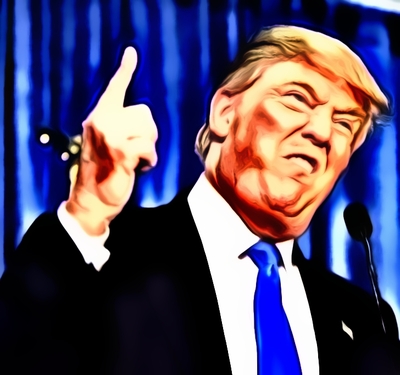
Viewing ubiquitous media coverage of Donald Trump and the poll numbers showing big leads for him all over the country, you still may be wondering whether he's well positioned to win actual races. If so, you've come to the right place for Trump skepticism. Let's for now focus on Iowa.
We have found growing antipathy toward Trump from the most critical voting bloc in Iowa - evangelical Christians. The Washington Post reports:
"There are no representative surveys of all evangelical leaders, but informal indicators suggest little support for Trump among elites. [Sen. Marco] Rubio led an October survey of board members of the National Association of Evangelicals asking which candidate they support - including Democratic candidates. Rubio also led an informal survey of 103 evangelical leaders and "insiders" by WORLD magazine, with [Sen. Ted] Cruz and Carly Fiorina also receiving support. Only 1 percent picked Trump."
There are lots of reasons for evangelicals to dislike Trump - his multiple divorces, his casinos, his crude language and his attack on religious liberty, to name just a few. ("For instance, some leaders cited his reported comments about his daughter's figure, including: 'I've said if Ivanka weren't my daughter, perhaps I'd be dating her.' ") But it was a small incident that got evangelicals, according to multiple sources, snickering about Trump: His refusal/inability to come up with a favorite Bible verse. (He later came up with one, after "citing a passage about not bending to envy that didn't seem to exist.") Saying initially that he would not reveal it because it was "personal" struck many faith leaders as a transparent excuse. (Think about how dishonest one must be to fake religious devotion and the contempt for people of faith it suggests.)
Evangelicals received further disturbing news when Trump declared that he did not know whether he'd move the U.S. Embassy to Jerusalem, and then when he canceled his trip to Israel. (By contrast, Mike Huckabee has been going to Israel since he was 17.) As the most pro-Israel group within the GOP, evangelicals are going to be savvy observers of the candidates' pro-Israel bona fides.
Now, it is one thing not to have evangelical support. It is another to have stirred up their anger and antagonism. Evangelicals have been the mainstay of caucus voters for many election cycles. They are critical both because they can network (pastor to congregant, and pastor to pastor) and because the caucus is an interactive process. Once you show up, you have to listen to people express their views, and then defend yours.
With a heavy element of "anybody but Trump" at the caucuses, Trump will need to find votes elsewhere. These voters have weeks before the caucuses to chat, work on their caucus appeals and round up like-minded friends. (It is true, however, that despite strong support for Sen. Ted Cruz (R-Tex.), some evangelicals will still go for Ben Carson, Rubio, Huckabee and Rick Santorum, making it more difficult for any single candidate to overtake him.)
Moreover, Trump is unlikely to get much support from other types of regular caucus-goers - the well-educated, well-to-do, moderate or female voters (his gender gap is large and widening). If he does not have evangelicals nor a whole slew of these other voters, where is his support going to come from? It's easy to answer a poll, say you're a Republican and say you're ready to vote in the caucuses; it's another thing to take time off from work or find child care, trek out on a winter's night, spend hours listening to neighbors and then tell them why you intend to vote for a candidate so many of them find so objectionable (only Jeb Bush has higher unfavorables).
Going through this analysis does not mean a Trump win is impossible. It surely does not mean he'll lack some support in Iowa. It does, however, point to how in a state like Iowa, Trump faces numerous variables and hurdles. Trump's constant attention-grabbing antics may momentarily lift poll numbers (reflecting views of those we are not certain will vote), but his outlandish comments also stir up opposition.
Trump has 100 percent name ID, yet only about 30 percent will vote for him. How likely it is that the 70 percent of Republicans who do not want to vote for him will suddenly learn to love him? Not very. So we are back to the question as to whether Trump can remake the caucus electorate, an iffy proposition.
The first state contest will be fascinating insofar as we will get some handle on who Trump voters really are, whether they turn out to vote and how strong the antipathy toward him from other Republicans may be. Early polls might for once be predictive, but there's a greater chance with all these developments that they are way off base.
Comment by clicking here.


 Contact The Editor
Contact The Editor
 Articles By This Author
Articles By This Author
